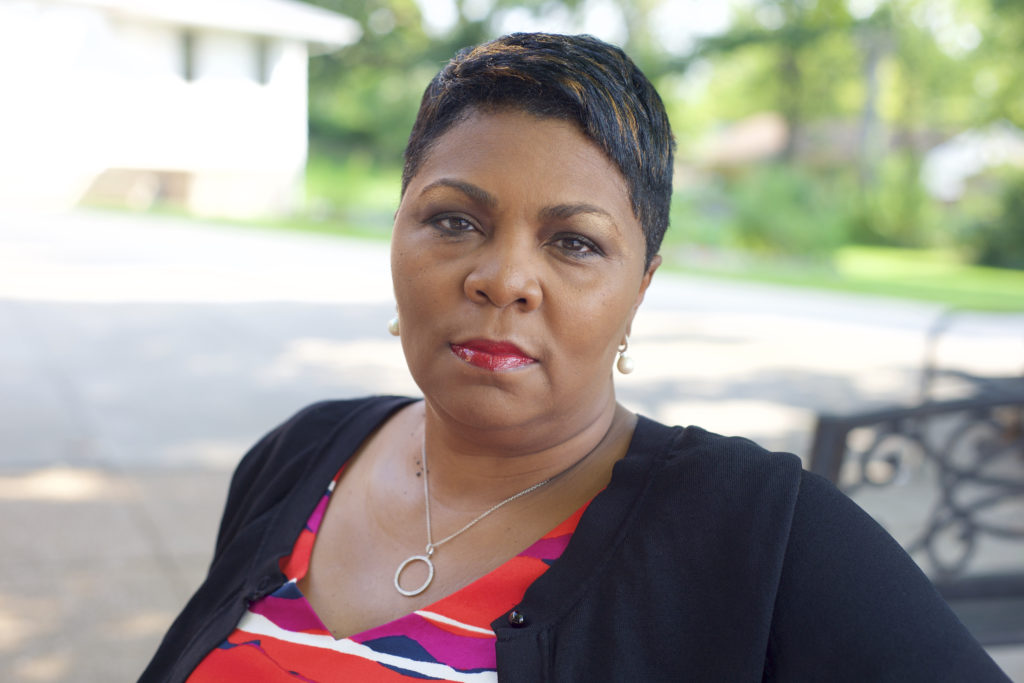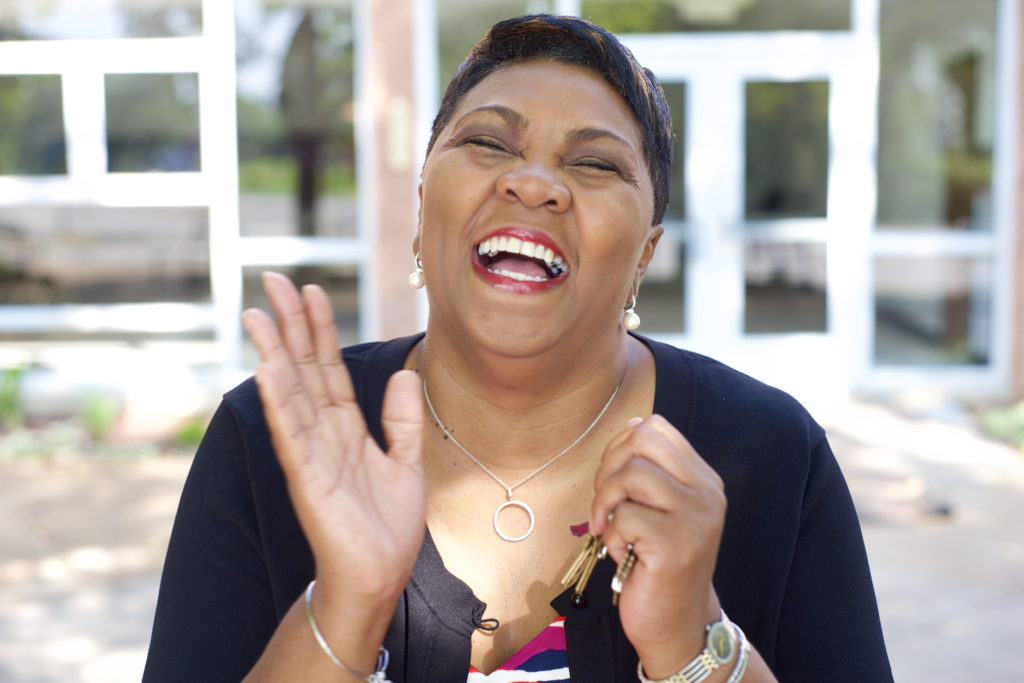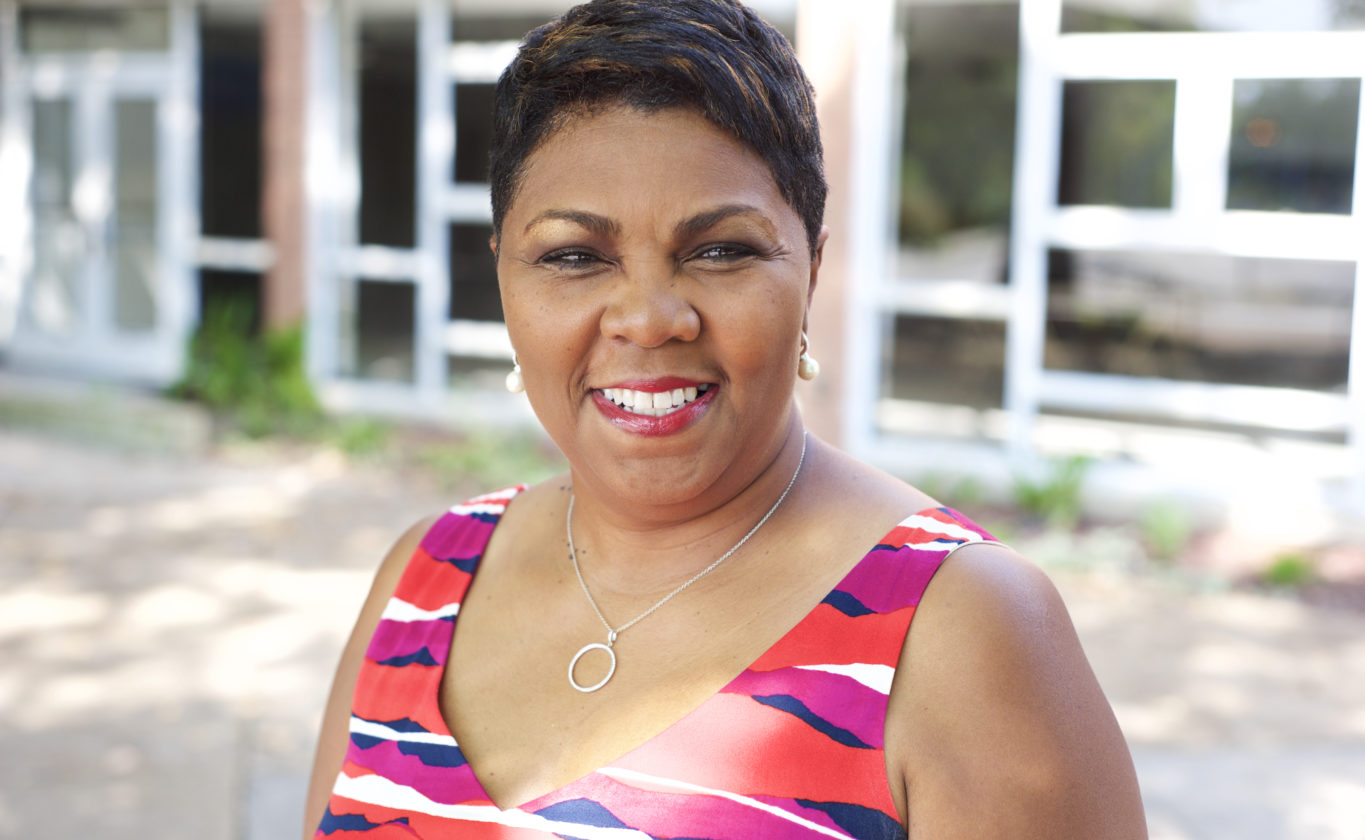David and Goliath is one of my favorite stories in the Bible. I always preached it from the standpoint of this divine power that comes from knowing for certain who you are and where you belong. But this morning when I was reading it, for the first time I recognized that the moment David beheaded the king, David became the giant the king feared. I started thinking of that in terms of dismantling structural and systemic oppression. The moment people who are oppressed began to walk and move in a power that has not been granted by the oppressor and have success is the moment when those people began to be feared.
I just see that being played over and over again — racially, sexually, economically, educationally. Ferguson is a microcosm of that, but that’s a world issue. I’ve been thinking about it locally because anytime anything happens, if it’s something positive in terms of protesters and activism, it’s typically downplayed in national media circles. If it’s something negative, it’s highlighted. Once the underdog is seen to be able to garner strength without the help of the empire, there’s a huge threat to those in power. I’m not vilifying or victimizing on either side. I’m making an observation of why it is so difficult for those who are perceived as having little or no power to be threatening to those where power is normative.
I have a woman in my church who is in her late 70s early 80s and had been in a nursing home at the height of this when winter was coming. The church helped her transition out of the nursing home to independent living in an apartment because that’s what she wanted to do. She was on a fixed income, she didn’t have much money, but she wanted to do something. So one day in church, she stands up and says, “I have something I want to announce.” I said, “Okay, what is it?” And she comes up with a little grocery cart. All I could see was yarn, and I thought, “What is she up to?” We have a coat giveaway every October, so this was October last year. She said, “I’ve been watching you out in the streets. I’ve been watching what’s going on. I’m just too old to be fighting those battles.” I remember when she was in the nursing home, a woman had taught her how to crochet. She said, “I forgot because I hadn’t done it in so long, but I went and got my book and freshened up on my stitches.” She had crocheted 100 hats and scarves to go with the 100 coats we give away. She said, “I used to be a math teacher. I can’t march with you in the streets. But I counted the stitches, and I calculated that I’ve walked five miles with my hands.”

Commissioner Traci Blackmon, photos by Lindy Drew
I’m not saying I was prepared, but I wasn’t surprised when I heard them cry out. What you learn quickly from a baby – and I’m not saying they’re babies, but I’m talking about the pain – is that when a baby is crying, the only thing that quiets a baby is to pay attention to why they’re crying. If your baby is hungry, there is nothing you can do to stop that baby from crying except to feed that baby. If a baby is hurting, you’ve got to address the source of that pain or the baby doesn’t stop crying. In that moment at Chaifetz Arena, there was nothing else to do. I was in the position of being the one to see that and make that call. I turned around to the panel and said, “With the exception of Cornell West, everyone who was going to speak who was sitting up here has spoken. I apologize to those who didn’t get to speak, but it’s their turn.” And I asked them if they were okay with that. I’m a mother, and I was a mother before I was a pastor. I hear the cries of our children. The children take precedence over whatever messages and motives we have. You have to care for them. That moment was to not be rendered invisible and to not be dismissed. They needed to be heard, and that was more important than anybody courageous, wise, and with something to say on that platform.
I would like to see implementation. The Commission has done some difficult work and has come up with some powerful recommendations. I am quite cognizant that they are recommendations. The harder work is putting teeth to them. And we don’t have implementation power. I would also like to see communities of those who have and those who don’t have recognize that we’re all the same. I would like to see conversations and boundary crossings happening that don’t have to be carefully negotiated and navigated. I’d like to see young Black children who have been born without great access in this region, which is not all Black children, I would like to see hope return to their eyes. I would like to see Black men who feel doomed to lives of mediocrity, because of mistakes they’ve made or because of chances they were never given, dream again.
There are some things I want to see in the radicalness of my love of God that the Commission didn’t dare touch.
I’m excited about the possibility of restructuring our municipal court system for equity instead of equality. I’m excited about the idea of the increase in the minimum wage. I’m excited about challenging an educational school system that uses a measurement tool that is flawed, at best, with accreditations and the impact that that causes. And there are some things I want to see in the radicalness of my love of God that the Commission didn’t dare touch. I would like to see a restructuring of the tax base in St. Louis so that all property tax money goes into a single pool that’s divided equally so every educational system, no matter where a child lives, receives the same financial appropriation as every other child. We didn’t go near that. And that’s pretty radical.

“What’s a lesson you’ve taken away since you started on the Commission that you didn’t know, but now it’s more clear?”
I’ve learned to trust my gut and the spirit that lives inside of me. I believe in the inherent good of all people. I really believe that. So when I push myself to remember that, even in the midst of everything, it helps me not lose sight of the humanity or even in acts of evilness and illness. And it works.
“When during this time has someone pushed you where you felt unbalanced and you’ve had to check yourself?”
There have been moments in the middle of protests when I’ve felt that way. There have been moments behind closed doors in meetings with people who should be united that I felt that way. There have been moments in Commission meetings when I’ve felt that way. But when I take a step back and remember that I believe because of my faith that all humanity exists because of the breath of God, that means that at its core, humanity is good. That’s how I choose to live my life.
“How does your faith strengthen the work you’ve had to do?”
I was privileged to be raised by people, by a village, who loved me unconditionally. And I recognize that that’s not everyone’s privilege, but it is my privilege. That’s the soil my faith was planted in. So even in places when people who I love and who love me have had different beliefs or understandings of God, I’ve never felt like that threatened their love for me. It matters what soil your faith is planted in. If that soil is fertilized with conditional love or with exclusionary love, it affects the way one’s faith grows.
I’ve been doing diversity work for a long time and I remember doing a camp called Anytown. In preparation, I was doing some internal work. And one of my colleagues at the time who was preparing with me was a gay, Jewish male. He said to me, “Being gay is the only thing you’re taught to hate before you know that that’s who you are.” I’m not gay, but I never forgot that. And even with racism, sexism, and classism, the soil that my faith is planted in always taught me to love all of me. So, I think it matters. Faith is not what I do. My faith is who I am. And I think that makes a difference. Because if it’s who I am, I can share it with you and still see who you are.


#FwdThruFerguson